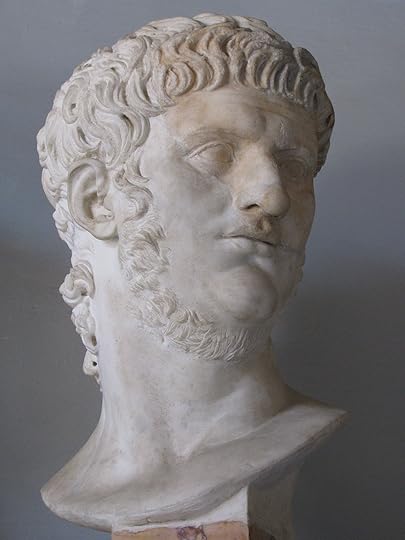Walk Through the WORD Acts 24-26
 Hover your cursor over this pic to share our Bible study on Facebook, Twitter, and Pinterest. Click on the appropriate button. Thank you!
Hover your cursor over this pic to share our Bible study on Facebook, Twitter, and Pinterest. Click on the appropriate button. Thank you!Walk Through the WORD Previous Posts
Today we walk through the Word Acts 24-26. Join us as we walk together through the Word of God–to better know Him and make Him known, to gain strength for the journey as we grow in our faith, and to join our hearts in unity as the body of Christ.
Acts 1-3
Acts 4-6
Acts 7-8
Acts 9-10
Acts 11-12
Acts 13-14
Acts 15-16
Acts 17:16-19:41
Acts 20-23
Acts 24-26
During our last part of the Acts study, we saw Paul resolute about returning to Jerusalem, in spite of many warnings from many people. And we saw the expected consequences of him carrying through with his objective. As is always the case, our God can use even the worst of circumstances for our good and His glory. In Paul’s case, his arrest and imprisonment resulted in even more opportunities to share the gospel, this time with many powerful people.
Walk Through the WORD Acts 24-26
Read: Acts 24:1-27
Key Points:
{vss. 1-9} – Once again we see evil attacking good, twisting the truth into outrageous lies. In addition, we see Tertullus, the lawyer for Ananias, using flattery to get into the good graces of Governor Felix. If that wasn’t bad enough, they had Jews who served as witnesses, asserting that the false charges brought against Paul were true. Here’s a break-down of the charges:
Paul was accused of being a trouble-maker who stirred up riots among the Jews all over the world. In truth, there were riots, but they were stirred up by the Jews in opposition to Paul and his teaching about Jesus the Christ.
They called Paul a ringleader of the Nazarene sect. In the first century, the Nazarene sect referred to followers of Jesus, so they were correct. However, the terminology used, “ringleader” and “sect,” carried negative connotations that inferred insurrection against Rome. You can read more about the Nazarene sect here: https://en.wikipedia.org/wiki/Nazarene_(sect)
Paul is also accused of trying to desecrate the temple. Since Paul had been known to have been among Gentiles, the Jews claimed that he hadn’t gone through the purification process, a charge that was absolutely false (Acts 21:26).
{vss. 10-21} Paul now gives his defense against the charges against him, first mentioning Felix’s history of judging for Israel. His counter includes these points:
He had gone up to the temple to worship–a fact Felix could easily verify–but he had also gone through the purification process.
The Jews had not found him arguing with anyone or stirring up a riot in the temple or city.
His accusers couldn’t prove any of the charges they were making against him.
Paul stated that he did indeed worship God as a follower of the Way (Christians), what the Jews had called a sect. He goes on to point out that he believes the same Law and Prophets of the Jews and the same hope in God that there would be a resurrection. I love that he mentioned that the resurrection would be of both righteous and wicked men. Perhaps this was Paul’s way of subtly warning the Jews that they needed to fall on the right side of that equation. Whatever the motivation for his statement, he then declares that his conscience is clear before both God and man.
In order to paint a true picture, Paul tells Felix that his purpose in coming to Jerusalem was to bring gifts for the poor (1 Corinthians 16:1; Romans 15:25) and to present offerings. In addition, when the Jews arrested him he was ceremonially clean, with no crowd or disturbance.
Paul is quick to mention the Asian Jews, who had followed him and stirred up trouble in every city where he sought to preach the gospel. He wants the Jews from Asia and the men who bore accusations against him now to tell him exactly for what crime they found him guilty.
Then Paul gets to the heart of the matter. The real reason he was on trial was because of his belief in the resurrection of Jesus. As believers, we must realize the importance and significance of the resurrection. Of all other proofs of Jesus as God, this is the one point that proves it above all others. During his earthly ministry, Jesus had clearly told His disciples and others that He would rise again (Mark 8:31; Matthew 17:22-23; Luke 9:22; John 2:19; Mark 14:58; Matthew 26:61; Matthew 12:39; Matthew 16:4; Matthew 27:63). His prophecy (and the prophecies of Old Testament prophets) had come true with startling accuracy.
{vss. 22-27} Felix had apparently already heard of the Way and adjourned the proceedings, declaring that he would decide Paul’s case when Lysias, the commander who had first arrested Paul, came to tell his part of the story. Though Paul was still under arrest, he was given some freedom, and his friends were allowed to take care of his needs. Several days later, Felix and his Jewish wife, Drusilla, visited Paul. Paul had the opportunity to speak to them about faith in Jesus, righteousness, self-control, and the coming judgment. This was obviously enough to make Felix nervous. Sadly, that is the response of many with whom we try to share the gospel. Rather than change their ways in response to the gospel message, they close their ears and refuse to hear more. Hoping for a bribe from Paul, Felix sent for him several times and talked with him. For two years, this went on, until Felix was replaced by Porcius Festus. In order to be in good standing with the Jews, Felix left Paul in prison, rather than grant him his freedom.
Read: Acts 25:1-27
Key Points:
{vss. 1-7} Once Festus took office, he immediately traveled from Caesarea to Jerusalem. There was much unrest in the area, so obviously Festus thought it prudent to approach the matter head on. The Jews, of course, quickly latched on to his visit as a way to once more bring Paul to Jerusalem, where they planned to have him killed. Festus told them that they could come to Caesarea to make their case against Paul, if he had done anything wrong. Once he returned to Caesarea, Festus convened court and had Paul brought before him. The Jews once more breathed out their lies and false charges against Paul, none of which they could prove.
 “Nero 1” by cjh1452000 – Own work. Licensed under CC BY-SA 3.0 via Wikimedia Commons.
“Nero 1” by cjh1452000 – Own work. Licensed under CC BY-SA 3.0 via Wikimedia Commons.{vss. 8-12} Paul once more asserted his innocence, and Festus, wanting to get in good with the Jews, asked Paul if he was willing to return to Jerusalem to stand trial there. Paul said he had done nothing wrong, the Jews hadn’t proved their case, and that as a Roman citizen, he appealed to Caesar. In all actuality, Paul was in a precarious position either way. He correctly discerned that he wouldn’t get a fair trial in Jerusalem. But at the same time, the Caesar at the time was Nero, a barbarous Roman leader who committed matricide and was well-known for his cruel mistreatment of Christians. Many historians believe that both Peter and Paul were martyred during Nero’s reign. Festus quickly jumped on Paul’s request, knowing full well that Paul wouldn’t fare any better by asking for a trial in Rome.
{vss. 13-22} Herod Agrippa, the Jewish king who ruled Judea under Roman jurisdiction, arrived in Caesarea with Bernice a few days later. Agrippa was the grandson of Herod the Great (Matthew 2:1). Bernice was his sister, with whom he was living incestuously. In visiting with Festus, the two men discussed Paul. Festus expressed his belief that the Jews’ charges against Paul were based on religious disputes, especially concerning “a dead man named Jesus who Paul claimed was alive.” See how the resurrection of Jesus once more comes into play? It is the key factor in our Christian beliefs, one that without doubt proves the deity of Christ. Agrippa asks to hear from Paul.
{vss. 23-27} The very next day, with great pomp, Festus, Agrippa, Bernice, and many other high-ranking officers and leading men of Caesarea, met in a great room. Paul was brought before them. Festus points out that he sees nothing in the charges brought against Paul that are deserving of death. But since Paul has appealed to Caesar, Festus has agreed, but has nothing to write to the emperor about Paul. His motivation for this meeting was to let them all hear Paul, so they could help him write the letter to Nero concerning Paul.
Read: Acts 26:1-32
Key Points:
{vss. 1-11} King Agrippa first gives his approval for Paul to speak, which he does, mentioning the fact that as the Judean king, Agrippa is more than aware of the Jewish customs and controversies. Paul then moves to his Jewish upbringing as a member of the Pharisees, and how ridiculous it was for him to be on trial for the very hope and faith in God that all Jews professed. Once more, he expertly brings the topic around to resurrection, the crux of the matter in his opposition from the Jews. He then gives an account of how he had once opposed Jesus of Nazareth and His followers, putting many saints in prison and casting votes for their deaths. He was so obsessed that he even went to foreign cities to hunt them down.
{vss. 12-23} In short order, Paul recounts his Damascus road experience, and follows with his obedience to Jesus. He mentions that the Jews have tried to kill him because of his testimony. Though he has said nothing other than what Moses and the prophets prophesied years before–that the Messiah would suffer and rise from the dead to proclaim light to his people and the Gentiles–the Jews have continued to seek his death.
{vss. 24-32} Festus interrupted, declaring Paul out of his mind. But very calmly and respectfully, Paul answers that his comments are both true and reasonable. After all, the works of Jesus were not done underground or in secret. Paul then boldly asks the king if he believes the prophets. King Agrippa recognizes this as Paul trying to persuade him to become a Christian. Agrippa, Festus and Bernice all leave, along with all those who sat with them. As they left, Agrippa and Festus agree that Paul has done nothing deserving of death. Agrippa ends the chapter on a chilling note: “This man could have been set free if he had not appealed to Caesar” –a statement that surely exposes Agrippa’s belief, that under the hand of Nero, Paul most certainly would not go free.
Walk Through the WORD Acts 24-26 Wrap-Up
Prayerfully consider the following questions. Feel free to add to our study by sharing in the comments below.
What are some modern-day examples of evil attacking good? What lies and twisting of the truth are used to do so?
How can simple word choices affect the impressions left upon people?
Do you think Paul does a good job of defending himself against the Jews before Felix? Why or why not?
Why is the resurrection of Jesus so important to our faith? Why was it a sticking point between Christians and the Jews?
Why do you think some people run away from the truth of the gospel?
If you had been in Paul’s shoes, what would you have done to pass the two years of imprisonment under Felix? What did Paul do during this time?
Was it wise of Paul to appeal to Caesar? Why or why not? Do you think it was God’s will for Paul to appeal to Caesar? (See Acts 23:11.) What was the danger of appealing to Caesar? What does this reveal about God?
What do you see as the main point of Paul’s testimony to King Herod Agrippa?
How did Paul handle the opportunity to speak before King Agrippa? What lesson is there her for us as modern-day followers of Christ?
All Posts in Our Study of Acts:
Acts 1-3
Acts 4-6
Acts 7-8
Acts 9-10
Acts 11-12
Acts 13-14
Acts 15-16
Acts 17-18:17
Acts 18:18-19:41
Act 20-23
The post Walk Through the WORD Acts 24-26 appeared first on Cathy Bryant.











CatBryant.com ~ Journey Blog
- Cathy Bryant's profile
- 390 followers




